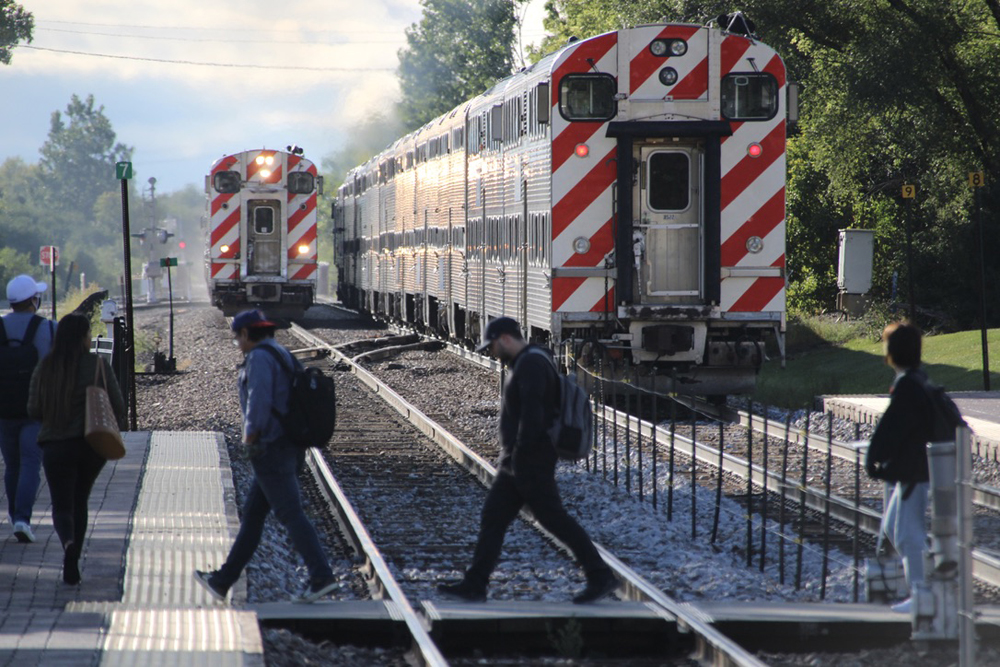
CHICAGO — A group of western Chicago suburbs opposed to the union of Canadian Pacific and Kansas City Southern is asking that regulators reconsider the CPKC merger.
In a federal lawsuit filed Thursday with the U.S. Seventh Circuit, the eight communities and one county that make up the Coalition to Stop CPKC called the Surface Transportation Board’s approval of the merger “arbitrary, capricious, an abuse of discretion, and otherwise not in accordance with law or supported by substantial evidence,” according to WTTW-TV.
The group wants the STB to require another environmental impact statement dealing specifically with the merger’s impact on the Chicago area and stronger mitigation requirements for that area.
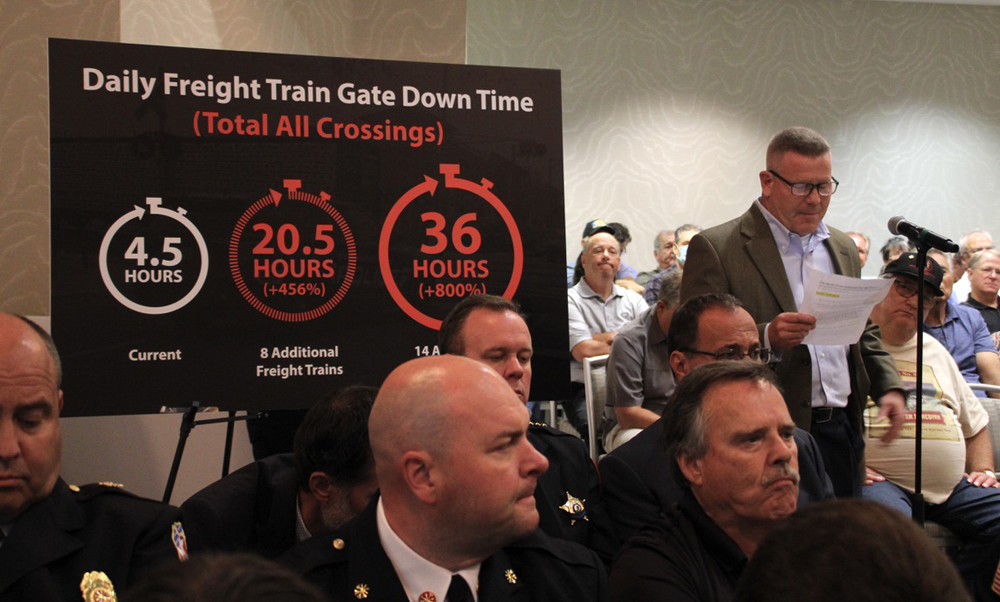
The coalition members originally sought more than $9 billion in mitigation to offset the impact of the merger’s estimated increase in freight traffic [see “Chicago suburbs seek $9.5 billion …,” Trains News Wire,” March 1, 2022]. The merger application projected the number of freight trains through the communities would increase from three to 11 per day, although coalition members claim the figure could be 14 additional trains per day [“Chicago suburbs focus on safety …,” News Wire, Sept. 13, 2022].
The coalition communities have largely focused on safety concerns regarding first-responder times in their fight against the merger, although they have also raised quality-of-life issues and cited potential negative impacts on development near the line CPKC shares with Metra’s Milwaukee West service.
While the group eventually decreased the amount of migitation funding it sought to some $400 million, STB Chairman Martin J. Oberman — a former Chicago alderman and Metra chairman — cited the original request in a press conference following approval of the merger. Oberman said the request “is simply not the real world and it isn’t going to happen. And it isn’t warranted. … The data show that it isn’t necessary” [see “Metra, Chicago suburbs see few concerns addressed …,” Trains News Wire, March 15, 2023]
Under the terms of the merger, mitigation for the Chicago suburbs will include CPKC funding for development of quiet zones; installation of a system that will provide first responders and drivers with advance notification of blocked crossings; and technology to minimize crossing-gate activation adjacent to Metra stations [see “CPKC offers plan to address traffic issues …,” News Wire, Jan. 27, 2023]. It also created a local liaison position, while the board said its seven years of oversight would allow community concerns to be addressed if they did, in fact, develop.
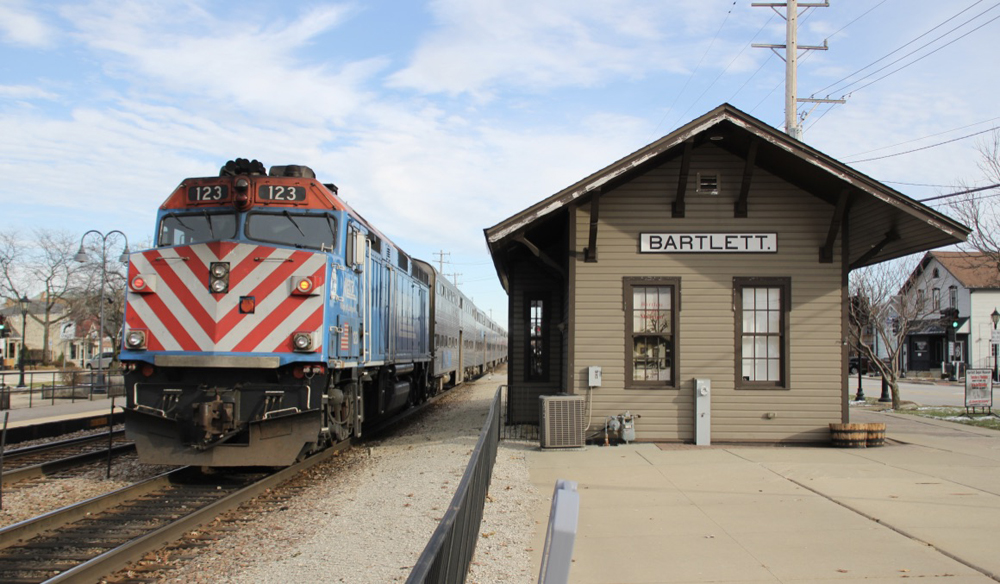
Coalition members were wholly dissatisfied with those terms, with Hanover Park Mayor Rodney Craig calling the merger decision “disgusting,” while Bensenville Village President Frank DeSimone said the decision ignored the group’s “concerns for safety; it ignored our concerns about quality of life; and it ignored our concerns about the negative consequences for economic development in our communities.”
Hanover Park, Bensenville, Bartlett, Elgin, Itasca, Roselle, Schaumburg, Wood Dale — with a combined population of about 300,000 — make up the coalition, along with DuPage County. The county has a population of more than 900,000 and includes all or part of all the member communities except Elgin.
An STB spokesman told WLS-TV the board does not comment on pending regulation. CPKC, in a statement, told the station:
“In our view, the U.S. Surface Transportation Board conducted a comprehensive, thorough and thoughtful review of the combination, and its environmental impacts, as part of a more than year-long regulatory review and environmental impact study. We believe that unprecedented examination of the facts produced the right final decision which clearly recognizes the many benefits of the CPKC combination.
“CPKC remains committed to being a good neighbor in the communities where we operate and to an open dialogue with communities across our network to address local concerns.”
The suit recalls actions by the city of Barrington, Ill., and a similar regional group, The Regional Answer to Canadian National, or TRAC, appealing STB approval of Canadian National’s purchase of the Elgin, Joliet & Eastern in 2008. Barrington would eventually appeal aspects of the board’s decision three times; its most recent appeal was turned down in 2018.






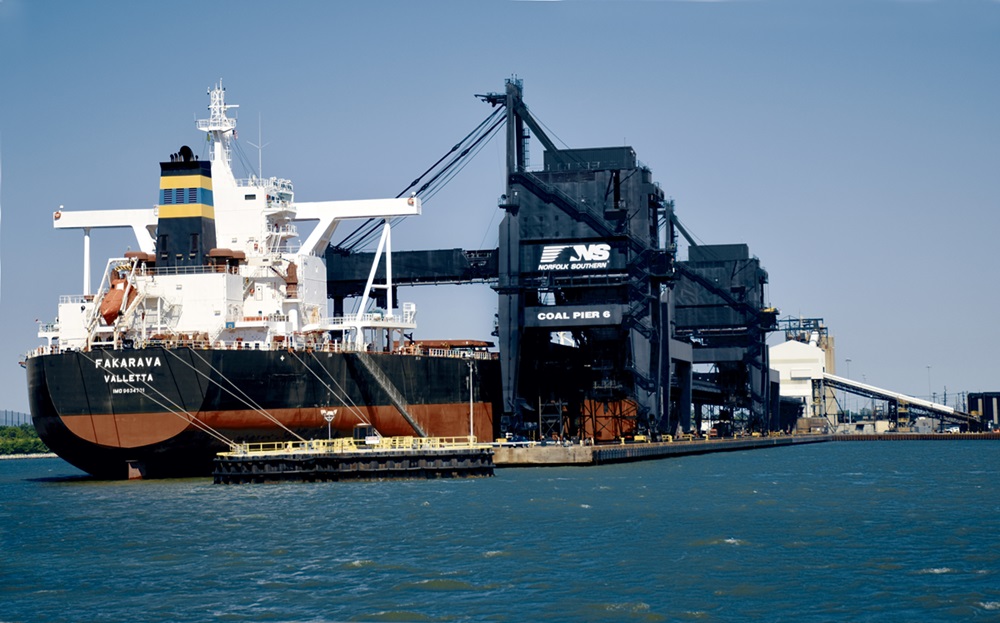
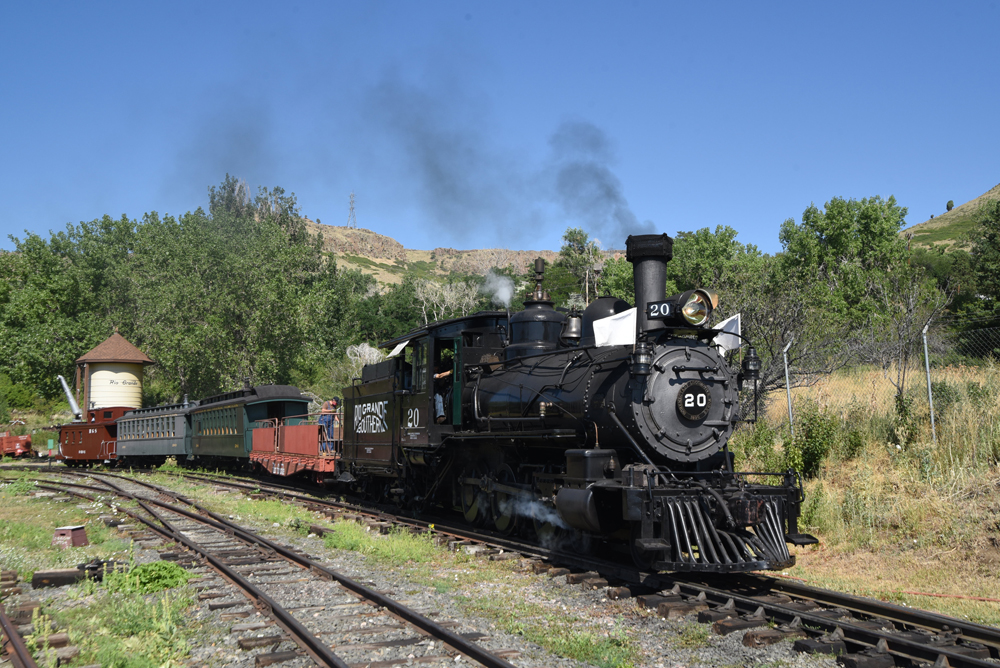
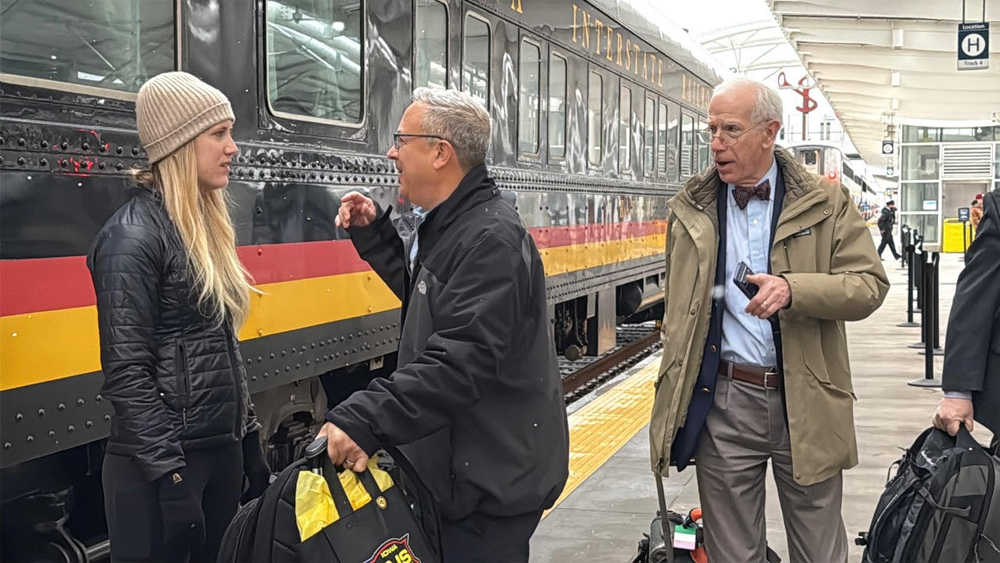
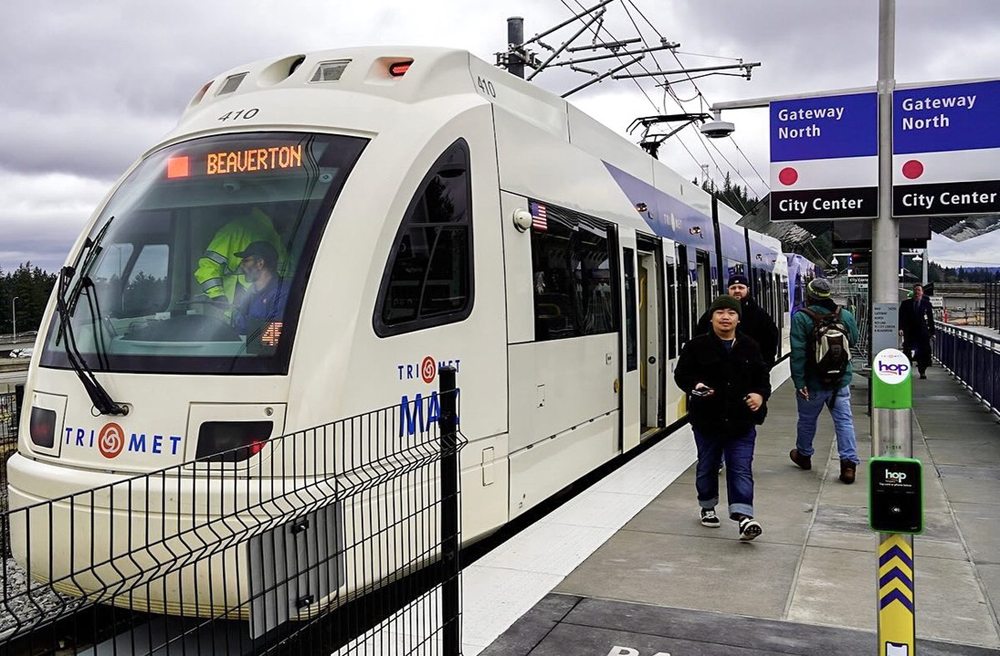




Yet another Chicago shakedown in progress. They see pockets. Deep pockets.
Mr. Roma, I already went head to head with Mr. Giblin on this and I suppose in bringing the issue up again apropos of this article I opened myself up to yet another.
The point I most wanted to raise is whether the elected and appointed community officials cited who are raising a stink about additional freight traffic CPKC is forecasting know that Metra owns the railroad but the train dispatching authority rests with the railroad they are fighting. Because if they did, I would have thought Metra would not have been alone in the effort to have dispatching authority conveyed. And conveyed not just on the Milw West but on the Milw North as well.
Regarding that 1985 agreement you cite, yeah Metra didn’t have a train dispatching center in service back then. Metra was in no position at the time to take over dispatching the C&M, Fox Lake, and Elgin Subs. By the early 90s Metra had a centralized dispatching center in service.
Regarding STB’s deciding that Metra’s modeling was faulty and that the additional trains CPKC hopes to add will not have significant adverse effects on Metra’s OTP, they don’t know that until those trains start operating. And in the event there is asif you or anyone thinks Oberman&Co will do ant
I’ve never seen such NIMBY lunacy in my life – it’s hard to believe another coalition could look worse than Barrington’s multiple fits, but they have accomplished this. I smell an extended attempt at a good old Chicago cash grab here, because anyone with experience living near railroads and a sufficient amount of common sense understands that visuals such as the one included in this story – the one where the stopwatch indicates “total gate down time” – is simple manipulation of statistics and influence peddling via faux-hysteria. If these freight trains take 5 minutes to clear a crossing, you’re looking at 40 minutes max per crossing. I would be embarrassed about this campaign if I lived in DuPage Co.
And, what’s “wrong” with “a good old Chicago cash grab”? It’s the way things get done in Chicago. History and tradition apply here.
I could be mistaken, but I thought I had read a new Dispatching Station is to be built in Kansas City. This will be used for South of the Canadian border.
It may be that the number of trains might not fit CP’s estimate. Those numbers were long before East Palestine. As well final approval before East Palestine. The possible legislation limiting train lengths especially Haz Mat might mean more shorter trains.
Marcus Hook PA had a similar problem, but high-speed passenger, not freight.
Lawsuit? No. They parlayed State and Federal money, plus some of their own and Amtrak’s and built an overpass.
Problem solved.
George Bernard Shaw said that “Only fools repeat the same things over and over, expecting to obtain different results.” Here we simply have a different set of fools who naïvely believe that they will see a different outcome than the previous set of fools who objected to CN’s acquisition of the EJ&E some 15 years ago.
I think they have a snowball’s chance in hell of succeeding, particularly since the merger is a done deal. Furthermore, courts usually defer to the agency with subject matter expertise (the STB in this case), unless the plaintiffs succeed at convincing the court that the STB either exceeded its legal authority, or that the STB failed to fulfil the statutory obligations delegated to the agency by Congress when they stated that the requested mitigation was unwarranted.
It’s pretty evident from the 2022 hearings on rail service quality issues that STB chairman Oberman is not a shill for the railroad industry, and is a stickler for detail. It will be difficult for the coalition to prove that the STB erred in approving the merger.
Looking back at historical data from the 1940s, this line hosted about 20 to 24 freight trains a day. Of course, these freight trains were shorter than today’s behemoths, and of course there is more commuter service today than in the Forties. Overall, the additional freight traffic that CPKC predicts as a result of the merger do not strike me as particularly outrageous. Perhaps the city fathers of Hanover Park, Bartlett, Itasca, et al should visit their neighbors along the UP in, say, Glen Ellyn and Wheaton, or on the BNSF in Westmont or Downers Grove.
As an aside, the railroad between Chicago and Elgin was built in 1872 – the year after the Chicago Fire. I have distaste for ignorant local officials who feel entitled to prevent a long-established railroad from using their property for the specific purpose for which it was built.
You can’t stop progress and this merger is not going to be undone or changed. Maybe the NIMBYs living in these surburbs want everybody to go back to horse and buggy days. They can always pack up and move somewhere else if they don;t like where they are living at present. The money and time being wasted on another silly court case being brought by these spolled surbuban brats can be used by them to move to another area maybe the forest or the desert where they don’t have to see or hear those “vulgar and dangerous trains” I have one word for those surbbanites in Chicago “Grow up and stop your whining and complaining”
Joseph C. Markfelder
Genius UP opened the door for this nonsense clogging up the courts…
Maybe these people should go live somewhere else. Until they do, they should refrain from tieing up the courts wth a frivolous lawsuit and should be severely punished for doing so.
In case these fools didn’t notice until the last couple of years, railroads run at grade in the Chicago suburbs. It’s up to the suburbs to arrange for emergency repsonse to either side of the tracks. Probably the various fire deppartments already have but these shakedown artist NIMBYs aren’t intelligent enough to know that.
Same where I live. City of Brookfield (Wisconsin) Fire Department, which has fire stations both north and south of the CPKC main, covers for TBFD (Town of Brookfield Fire Department) which does not. (Dispatch is county-wide by Waukesha County 911.) We haven’t complained about the CPKC merger.
The answer is so easy…..Durbin and Duckworth put a rider on the next transporation bill to study-fund over/underpass abatement for first responders in the impacted zone.
As for Bensenville, they already have experience in lawsuits regarding transporation and “quality of life”. They have fought (successfully) the City of Chicago and CDOT for years over O’Hare Expansion. However, many of the current residents chose to live in this town long after the airport and railroad had existed, so there is some struggle to just how much remediation should be expected going forward.
$9 billion was ridiculous.
$400 million for some over/underpasses is more agreeable and can be funded over the next 5 years. But CPKC should not pay for it.
I remember the outrageous wants the Barrington crowd made at first for the EJ&E buyout by CN. CN was negotiable, but many were rejected, hence the lawsuits (and the losses). THese people will see the same.
Ouch. They actually went down the “arbitrary, capricious” rabbit hole. Mr. Oberman’s retort to this should make for some fine ink.
I agree with the NIMBY bashing in the above posts. What I would love to know is do any of the town officials cited know that Metra owns the MILW West Line, is responsible for all main track engineering functions, but the hated CPKC has the train dispatching rights? And despite Metra’s appeals to the STB that conveyance of train dispatching to them be a condition for STB approving CP+KCS, Marty Oberman refused. If these officials want to go after the STB, go after them and their useless chairman for that! No,
Metra is not going to refuse the trains CPKC offers up. But at least the American taxpayer-supported owner of that line should have the control of train movements over it, not the freight railroad headquartered in another country.
This is a response to Mark Shapp’s statement that “But at least the American taxpayer-supported owner of that line should have the control of train movements over it, not the freight railroad headquartered in another country.”
First, Oberman may be the chairman of the STB and its most well-known member, but the merger was approved by the whole board by a vote of 4-1, and not by its chairman acting alone. As the senior member of the Board, he can act as its spokesperson.
Second, an agency like the STB makes its decisions based on the laws by which Congress delegated its authority to the agency, and based on the evidence. The statutory provisions under which the Board approves mergers is “when it finds the transaction is consistent with the public interest.” The statute does not favor one party based on where it is headquartered or on the basis of it being taxpayer-funded.
Third, the dispatching arrangement between CP and Metra has existed since the bankrupt Milwaukee Road sold its suburban territory to RTA in 1985. The wisdom of this arrangement then or now is irrelevant because the parties mutually established a contractual agreement. Courts do not routinely nullify existing contracts lightly, except in cases involving fraud or other illegality.
Fourth, the STB declined to require CP and Metra to amend the contract to give Metra dispatching control as a condition of the merger is that they did not find Metra’s statements about potential commuter delays to be persuasive. This is discussed at length in the STB opinion. In brief, the STB determined that Metra’s computer modeling was faulty, and tended to magnify the effect of the eight additional freight trains CP wishes to add.